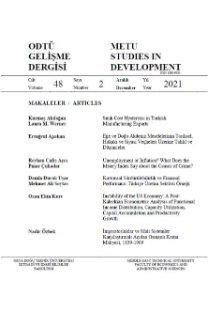Tekeli ve İlkin’in İktisat Tarihçiliğinin niteliği
Bu yazı, Tekeli-İlkin tarihçiliğinin niteliğini, onların önemli iktisat tarihi çalışmalarından biri olan devletçiliğin oluşumu örneğinde ele alıyor. Yazıda öncelikle bu ikilinin ortak iktisat tarihi çalışmalarının nesnel ve öznel koşullarına ve ek olarak 1960’ların ekonomik kalkınma isteği ile 1930’ların devletçiliğinin benzerliğine değiniliyor. Tekeli ve İlkin’in çalışmasında, devletçilik öncesinin iktisat tarihi, devletçiliğin 1930’lardaki düşünsel kökenleri, sektörel politikalar ve sanayileşmenin öne çıkması, kurulacak sanayi tesisleriyle ilgili ekonomik ve teknolojik yapılabilirlik çalışmaları ve bunları tamamlayan yasal ve kurumsal düzenlemeler gibi konuların belgelere dayalı bir bütünsellik içinde ele alındığı vurgulanıyor. Tekeli ve İlkin’in bu çalışmalarıyla yalnız Türkiye iktisat tarihinin devletçilik gibi en tartışmalı konularından birine başarılı bir biçimde açıklık getirmekle kalmadığı, ayrıca yeni araştırma alanlarının ipuçlarını da verdiği sonucuna varılıyor.
Characteristics of Economic History Studies of Tekeli and İlkin
This article aims to analyze the qualitative aspects of the economic history studies of Tekeli and İlkin on the basis of etatism which dominated Turkey’s economic policy stance in the 1930s. The article first outlines the objective and subjective conditions that brought their studies into existence. It summarizes the main framework of the Tekeli and İlkin approach as shaped by economic developments before etatism and the latter’s ideological roots and the main debate on it. It then draws parallels between the desire for economic development in the 1960s and the 1930s. Adopting a fully documentary history approach, Tekeli and İlkin provide a full account of the factors that have led to the emergence of industrialization as the key objective, together with legal and institutional developments of the period as well as sectoral policies and economic and technological feasibility reports. The article concludes that Tekeli and İlkin’s research has not only clarified the concept of etatism as one of the most controversial subjects of Turkish economic history but has also opened quite successfully new tracks for further research.
___
- AYDEMİR, Ş. S. (1932), “Şeker İstiklali ve 160 000 ton Türk Şekeri”, Kadro, Sayı. 11, s. 5-16.
- BAŞVEKİL, İSMET (İnönü) (1933), “Fıkramızın Devletçilik Vasfı” Kadro, Sayı. 22, s.4-6.
- BLOCH, M. (1953), The Historian’s Craft, Vintage Books, New York
- BORATAV, K. (1982), Türkiye’de Devletçilik, Savaş Yayınları, Ankara.
- CARR, E.H. (1964), What is History?, Penguin Books.
- FRY, M. (1972), Finance and Development Planning in Turkey, Leiden: Brill.
- HALE, W. (1981), The Political and Economic Development of Modern Turkey, St. Martin’s Press, New York.
- HINES, W. D., Memmerer, E. W., Dorr, G. H. vd. (1936), Türkiye’nin İktisadi Bakımdan Umumi Bir Tetkiki, Ahmet İhsan Matbaası, Ankara.
- İLKİN, S. ve İNANÇ, E. (eds.) (1967), Planning in Turkey, ODTÜ, Ankara.
- KARPAT, KEMAL (1959) Turkey’s Politics, Princeton.
- KEPENEK, YAKUP (1990), Türkiye’de Kamu İktisadi Teşebbüsleri (KİT), İstanbul; Gerçek Yayınevi, 100 Soruda Dizisi Sayı. 57, s. 111.
- KEPENEK, YAKUP(2012), Türkiye Ekonomisi, Remzi Kitabevi, İstanbul, 26. Basım.
- KEYNES, JOHN M. (1936), The General Theory of Employment, Interest and Money, Macmillan, Londra.
- KİLİ, SUNA (1969), Kemalizm, Boğaziçi Üniversitesi, İstanbul
- SINGER, M. (1977), “The Economic Advancement of Turkey, 1938-1960”, Turkish Economic Society, Ankara, s. 26
- TEKELİ, İ. ve İLKİN, S. (1982), Uygulamaya Geçerken Türkiye’de Devletçiliğin Oluşumu, Türkiye Belgesel İktisat Tarihi 3, ODTÜ, Ankara.
- THORNBURG, M.W., SPRY, G. ve SOULE, G. H. (1949), Turkey, An Economic Appraisal, The Twentieth Century Fund, New York.
- ISSN: 1010-9935
- Yayın Aralığı: Yılda 3 Sayı
- Başlangıç: 2018
- Yayıncı: ODTÜ İİBF
Sayıdaki Diğer Makaleler
Türkiye ekonomisinde üretim ve istihdamın sektörel gelişimi: Bir girdi-çıktı analizi
Avrupa Birliği’nde ekonomik ve parasal birlik süreci: Geçmiş ve gelecek
Osmanlı devlet ve vilayet bütçeleri (1840-1913) nasıl okunmalıdır?
Tekeli ve İlkin’in İktisat Tarihçiliğinin niteliği
Türkiye’de yoksullara yönelik harcamalar
ODTÜ İktisat Bölümü: Yarım yüzyılı aşan bir süreden bazı gözlemler
Son iki yüzyılda Türkiye’de gelirin bölüşümü
Bruce H. RANKİN, Işık A. AYTAÇ, N. Banu BİRDAL KAVAKLI
İlhan Tekeli ve Selim İlkin’in Türkiye’de Yükseköğretim ile ilgili çalışmaları
